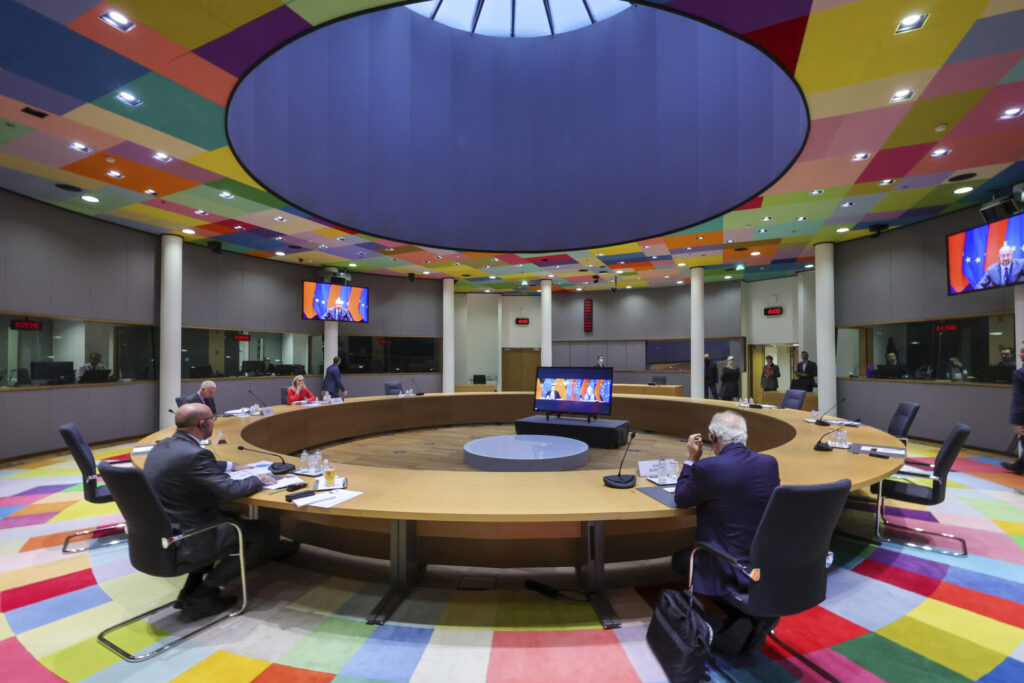 Have the article read by OpenAI (Beta). Please note that AI translations may take some time to process.
Have the article read by OpenAI (Beta). Please note that AI translations may take some time to process.While the president of the European Commission, Ursula von der Leyen, stressed that EU states would prefer negotiations to a trade war she left an implied threat of protectionist measures on the table.
”We have tools to protect our market,” von der Leyen told an AFP reporter who conducted the interview on behalf of the European Newsroom, adding that ”we prefer to have negotiated solutions”.
Von der Leyen, top EU diplomat Josep Borrell and Charles Michel, the president of the European Council, will be in Beijing on Thursday and meet Chinese President Xi Jinping and Premier Li Quiang. The summit marks the first in-person EU-China summit since 2019.
The commission president cited a lack of access for European companies to the Chinese market and preferential treatment of Chinese companies through subsidies as specific problems for the EU. According to von der Leyen, this is part of the reason why the trade imbalance has doubled to almost 400 billion Euro in the last two years.
She further said that it was important to see China not only as a trading partner ”but also as a technological competitor, a military power, and as a global actor that has distinct and divergent views on the global order”.
China has changed and, after a phase of opening and reform, is now pursuing a policy in which security and control are central, according to von der Leyen.

A ”summit of choices”
Stressing that both sides would have to decide whether they are prepared to make concessions to preserve the relationship, she dubbed the talks a ”summit of choices”. The commission president said that Europe was not trying to ”de-couple” itself from the Chinese powerhouse, but rather to ”de-risk” ties that had become too one-sided.
While the European market has proved a lucrative draw for Chinese investment and exports, EU firms have not enjoyed open access to China’s growing consumer middle class.
Chinese state aid to its companies and their preferential treatment in terms of market access are also causing displeasure. ”For every three containers that go from China to Europe, two containers return empty,” said the commission president, visualising the imbalance.
Strong overproduction in China is leading to dumping prices. Domestic demand in the country itself is low due to weak economic growth. In addition, some other countries are closing their markets to Chinese products, which means that the products end up in Europe, emphasised von der Leyen.
The EU side is also ”looking at the question of hidden and direct and indirect subsidies to Chinese companies in competition to the European companies”, according to the commission president.
The commission is currently carrying out an investigation into potentially competition-distorting subsidies for electric vehicles coming from China, fearing subsidised imports could stifle EU innovation in a huge new sector.
”We have learned our lessons from the solar panels,” von der Leyen said, citing a green tech sector now dominated by Chinese firms amidst a global rush to decarbonise energy production.
Concerns about possible Chinese retaliation
Separately, a senior European official speaking on condition of anonymity, laid out Brussels’ trade concerns in more detail – along with concerns about Chinese retaliation.
”We’ve seen retaliation by the Chinese before. It’s usually not symmetric. So it doesn’t necessarily hit exactly the same sectors,” the official said.
”If they want to retaliate they’ll probably hit other sectors, politically sensitive sectors.”
– Senior European Official
The EU official noted that Europe is entering an election cycle in the run-up to next year’s European Parliamentary elections, and that relations with China could come under political pressure. ”The Chinese side is very well aware of this,” he said.
”My feeling is they’re fully aware of the overcapacity and the effect it has around the world, not just on us, but we’re seeing basically a domino effect as other major economies are closing their market.”
The United States – firstly under former president Donald Trump and continuing under President Joe Biden – has taken a tougher line on China.
Besides trade: Russia, Sanctions and the Climate
Europe, von der Leyen said, will take its own route but shares many of Washington’s concerns, including the one about China’s support for Russia despite Moscow’s war against Ukraine.
The commission president further stated that the EU wants to persuade China to use its influence on Russia, calling on the government in Beijing to take action against Chinese companies involved in circumventing the sanctions.
While von der Leyen highlighted China’s efforts in the area of biodiversity and the reduction of methane gas as positive, she also warned that China’s attitude at the COP28 summit in Dubai was under scrutiny. The West is anxious that the Asian giant pull its weight in reducing greenhouse gas emissions. China is responsible for 20 percent of global greenhouse gas emissions.
”China’s actions at the COP [World Climate Conference in Dubai] will be decisive.”
– Commission President Ursula von der Leyen
However, the issue of compensation payments for climate damage is likely to be a sticking point at the COP, as a senior EU official noted. China sees itself as a developing country and does not want to pay into the relevant funds as Western players such as the EU and the USA are demanding.
Von der Leyen also intends to raise the case of European parliamentarians sanctioned by Beijing. ”I have always considered these sanctions to be unjustified,” she said.
French MEP Raphaël Glucksmann and Germany’s Reinhard Bütikofer, president of the European Parliament’s delegation for relations with China, were sanctioned by Beijing in 2021 for denouncing Chinese repression against the Muslim Uyghur minority.
This article is published weekly. The content is based on news by agencies participating in the enr.
